Tehran Reacts To Russian Envoy’s Provocative Comments
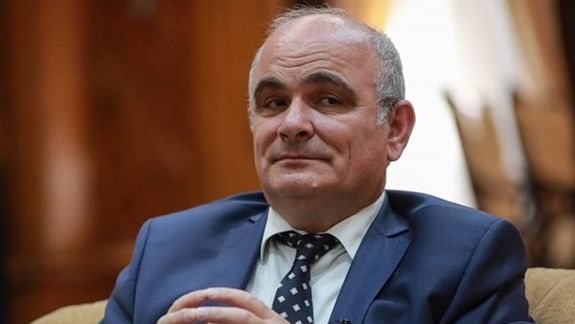
Iran's Foreign Ministry criticized on Wednesday recent remarks by Russian envoy in Tehran about Iran owing a lot of Money to Russia and the West promoting homosexuality in Iran.

Iran's Foreign Ministry criticized on Wednesday recent remarks by Russian envoy in Tehran about Iran owing a lot of Money to Russia and the West promoting homosexuality in Iran.
Ministry spokesman Naser Kanaani said, “We definitely expect that respected foreign ambassadors residing in Tehran do not comment and intervene on Iran's internal issues.”
Iranian media have often perceived Levan Dzhagaryan's (Jagarian) controversial behavior as intervention in Iran's internal affairs or as flat insults although he does not seem to be bothered by the accusations.
Kanaani added that the foreign ministry is absolutely sensitive to these issues and will act based on its inherent responsibility.
“We must refrain from fueling issues that cause unnecessary problems in our relations with our neighbors,” he emphasized. “We must read Dzhagaryan's statements carefully and see how much his opinion is consistent with his statements.”
On social media and recently in Tehran media, however, Iranians have been demanding an answer to the ambassador's outrageous and provocative remarks.
“Where are the government and the foreign ministry?" Khabar Online, a moderate conservative news outlet in Tehran asked on Sunday, July 17, after Dzhagarian told Sharq newspaper a day earlier that "We have always been on Iran's side, but the West want to bring their absurd values such as homosexuality and other dirty things to Iran but we object to that!"
Many Iranians on social media reminded the ambassador that Russia is a large producer of pornography in the world.
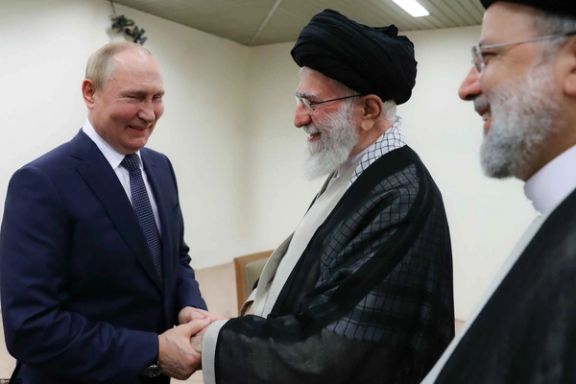
The White House says Russian President Vladimir Putin's trip to Iran on July 19 shows how isolated Moscow has become in the wake of its invasion of Ukraine.
John Kirby, the White House's chief National Security Council spokesman, told reporters on Tuesday, “I would say three things about this trip. One it shows the degree to which Mr. Putin and Russia are increasingly isolated. Now they have to turn to Iran for help.”
“Two, it shows the degree to which his own defense industrial base is having a hard time keeping up with his unprovoked war in Ukraine,” he went on, highlighting Russia’s troubles regarding precision guided munitions and advanced systems, tanks, even aircraft, particularly with the microelectronics due to the sanctions and export controls. He said the pace of operations in Ukraine has also become a challenge.
Kirby said the third thing is Russia “has absolutely no intention of stopping the war” and negotiating a settlement with Ukraine, because he wants to buy several hundred UAVs from Iran “to continue to kill Ukrainians.” Putting prefers to turn to Iran rather than just doing the right thing... and ending the war, he added.
However, Kirby said there is no indication yet that the sale has actually occurred, and that Iran has started training Russian forces to use armed drones, referring to remarks by Jake Sullivan, the US National Security Adviser, who said last week that Tehran planned to supply “several hundred UAVs, including weapons-capable UAVs, on an expedited timeline.”
He said the US is watching the situation closely, as “the Iranians have a domestic production capability of drones and those drones have lethal capabilities. We've seen that for ourselves in the attacks that they have perpetrated in Iraq and in Syria against our own troops and against our own facilities there.”
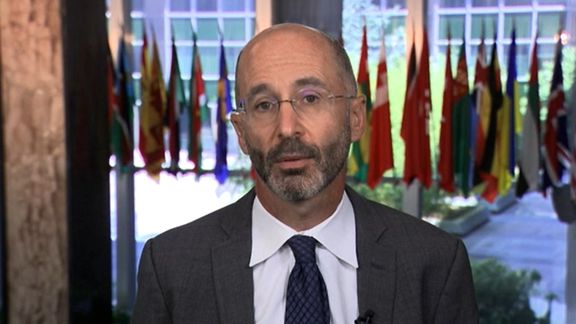
Reacting to Vladimir Putin’s visit to Tehran, US envoy Robert Malley said Tuesday Iran has a stark choice between a nuclear deal or more isolation with Moscow.
In an interview with CNN, Malley, the United States special envoy for Iran, said, “It can opt for a position of relative dependency on Russia, which itself is isolated internationally…or it can choose to come back into the deal that’s been negotiated...and have normal economic relations with its neighborhood and with Europe and the rest of the world.”
The special envoy suggested that not “getting back into the deal” would mean Iran “having to turn to Russia, having to sell on drones to Russia, a choice that is not a particularly attractive one…”
The US recently alleged that Russian officers visited Iran in June and July to review possible drone purchases. Malley said any drone shipment from Iran was “of course of concern” and would “bolster Russia’s ability to wreak havoc.” He said it “speaks volumes” that Iran would be in a position where it sold drones to Russia “against its professed position of neutrality in the conflict.” Without giving details, Malley said the US would “use the tools at our disposal” to sanction any supply of weapons to Russia.
Iran’s supreme leader Ali Khamenei, meeting President Vladimir Putin, gave Tuesday the clearest expression yet of support for Russia over Ukraine, which had “taken the initiative” while “the other side, with its own initiative would have created a war anyway.”
But Russia and Iran have long had some military cooperation, especially supporting President Bashar al-Assad in Syria, during the operation of the 2015 nuclear deal (the JCPOA, Joint Comprehensive Plan of Action) until President Donald Trump withdrew the US in 2018, prompting Iran to begin exceeding JCPOA limits in 2019.
Malley again called Trump’s decision to leave the agreement “catastrophic,” while reiterating that the onus to revive the JCPOA, which has been the subject of year-long negotiations between Iran and world powers, lay in Tehran.
‘A few weeks’
Malley dismissed a suggestion Iran might be responding to US actions, being pushed towards Russia for example not just by US ‘maximum pressure’ but by Biden’s statement during his recent trip to Israel and Saudi Arabia that the US would not leave a regional “vacuum” to be filled by Russia, China, and Iran.
Iran’s leaders have argued with President Joe Biden continuing Trump’s sanctions, has refused as part of JCPOA restoration to lift them all, including listing Iran’s Revolutionary Guards as a ‘foreign terrorist organization,’ and to give assurances it would not impede Iran in benefiting from the agreement.
Malley refused to give a deadline for JCPOA talks.He said Tehran was “a few weeks” from creating enough fissile material for a bomb, “if it chooses to enrich at that level,” although the weaponization “would take longer.”
“Every day” made JCPOA restoration and the return of Iran’s nuclear program to a “safe box” less likely, Malley argued. Terms for reviving the deal had been agreed, he suggested, by all parties in talks other than Iran – including Russia as well as the US, China, France, Germany and the United Kingdom.
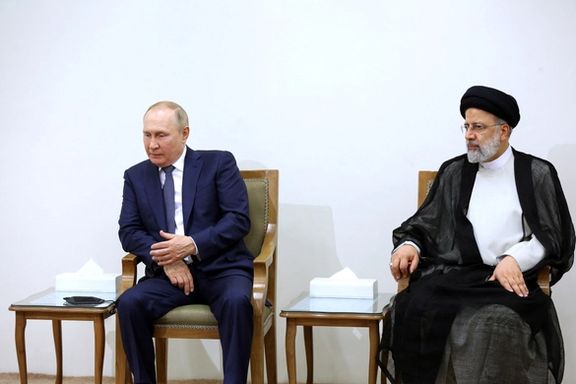
After Iranian leader Ali Khamenei met Russian President Putin Tuesday afternoon, Iran’s main news agency found the two moving closer with the Ukraine crisis.
IRNA headlined its account of the meeting with a call, endorsed by both Khamenei and Putin, for United States forces to be driven out of north-east Syria, “east of the Euphrates [river]…an area rich in oil and agriculture,” where American troops, first deployed in 2015, have remained since 2018 to ‘secure’ Syria’s main oil-fields.
But perhaps a more notable part of IRNA’s report was Khamenei’s clearest expression yet of support for Russian action in Ukraine. While describing war as “brutal and hard,” Iran’s leader suggested that had Russia not “taken the initiative, the other side, with its own initiative would have created a war anyway.”
Iran’s leader cited the 2014 Ukraine “coup” – when protests overthrew Moscow-inclined Ukrainian President Viktor Yanukovich and prompted Russia’s seizure of Crimea – and the expansion of Nato, which has expanded to take in 14 eastern European countries since 1999. “Nato is a dangerous creature,” Khamenei said, “[that] didn’t recognize any limits or borders. If you cannot stand up to them in Ukraine, then a little while later, with the excuse of Crimea, they would have started this war anyway.”
World events, Khamenei said, had increased the need for “reciprocal cooperation” between Iran and Russia, meaning that “many agreements and contracts, including in oil and gas…must be pursued…and become operational.” This was a “necessity…especially after western sanctions” against Russia over Ukraine, Iran’s leader said. Russian energy giant Gazprom and the National Iranian Oil Company signed a $40-billion energy memorandum-of-understanding Tuesday morning.
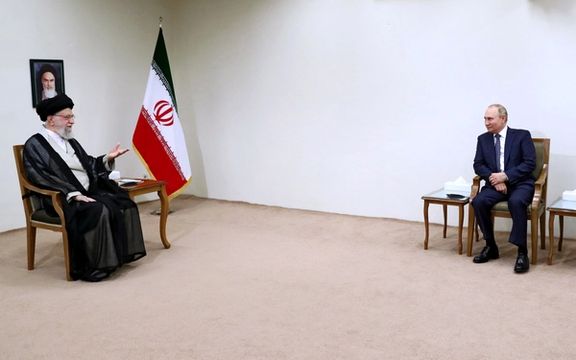
The effect of US Middle East policies – including in Syria, Iraq, Lebanon and Palestine – was becoming more limited, Khamenei said. The American presence in north-east Syria should end with their expulsion. President Ebrahim Raisi also referred to the US troop presence in Syria Tuesday to Iranian state television, arguing that it destabilized the country.
Cooperation between Moscow and Tehran would reach its “zenith” in the coming period, Khamenei said, stressing the need alongside other countries of continuing to expand trade away “step by step” from the dollar as the world “lost trust” in the US currency. Both Russia and China – whose dollarized bilateral trade fell below 50 percent in 2020 – are encouraging other countries to follow suit, including through groupings like the Shanghai Cooperation Organization (SCO), which Iran joined last year.
US ‘deceitful’
“Americans were both bullies and deceitful,” Khamenei said, as had been shown by their role in the dissolution of the Soviet Union, presumably in fostering nationalism in the Soviet republics.
Putin, IRNA reported, had said that while nobody wanted war, the West’s behavior had left the Kremlin “no choice but to react.” The Russian president said, according to IRNA, that some European countries had opposed talk of Ukraine joining Nato but had been cajoled by the US, revealing their lack of effective sovereignty.
The West did not consider Ukraine as a suitable candidate for NATO membership before the Russian invasion in February.
Putin described the US killing 2020 of Iranian general Qasem Soleimani “as another example of US evil.” He pointed out that sanctions against Russia over Ukraine had punished the west and others through higher energy prices and a food crisis.
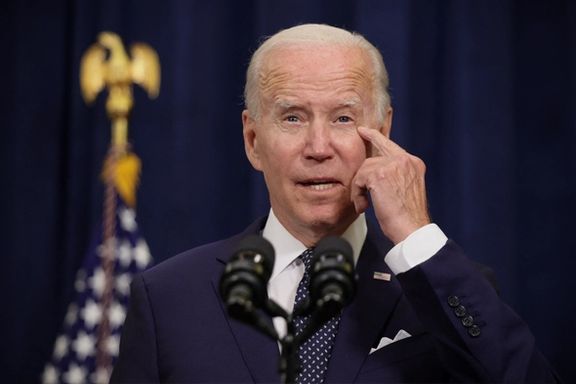
US President Joe Biden has issued an executive order to expand tools available to deter and disrupt hostage-taking and wrongful detentions of Americans.
Declaring a urgent need to deal with this threat, Biden on Tuesday authorized agencies to impose costs and consequences, including financial sanctions and visa bans, on malicious actors involved in hostage-taking, and charges agencies with developing new methods to deter hostage taking.
Foreign governments and human rights organizations have accused Iran of detaining foreigners and dual nationals on trumped up charges to use them for getting concessions from Western countries. US citizens Siamak Namazi and his father Baquer (Bagher) Namazi, Emad Shargi, and Morad Tahbaz and permanent resident Shahab Dalili are among the dual nationals or foreigners held in Iran on such charges. Iran also holds citizens of several countries including Germany, Austria, and Sweden, as de facto hostages.
In the executive order, known as Bolstering Efforts to Bring Hostages and Wrongfully Detained United States Nationals Home, Biden said “Terrorist organizations, criminal groups, and other malicious actors who take hostages for financial, political, or other gain — as well as foreign states that engage in the practice of wrongful detention, including for political leverage or to seek concessions from the United States.”
The US government must redouble its efforts at home and with partners abroad to deter these practices and to secure the release of those held as hostages or wrongfully detained, read the order.
“I therefore determine that hostage-taking and the wrongful detention of United States nationals abroad constitute an unusual and extraordinary threat to the national security, foreign policy, and economy of the United States,” he said.
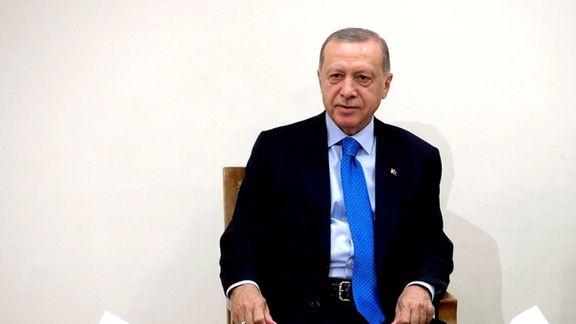
Meeting Turkey’s President Recep Tayyip Erdogan in Tehran noon Tuesday, Iran’s leader Ali Khamenei stressed the importance of Syria’s territorial integrity.
Tehran opposes any plan, being considered in Ankara, for expanded Turkish military intervention in Syria aimed variously at bolstering Syrian rebels, allowing refugees to return, and weakening Kurdish groups linked to Kurdish rebels inside Turkey.
Khamenei stressed Iran accepted Erdogan’s hatred of “terrorist groups,” presumably a reference to PYD (Democratic Union Party), which is linked to the Kurdistan Workers Party (PKK), active mainly in Turkey, and Pejak, which operates in Iranian Kurdistan. The Iranian leader said Tehran would cooperate with Turkey “against terrorism” and emphasized Tehran’s respect for Turkey’s security and borders.
But Khamenei also said that ‘terrorism’ in Syria was not limited to one group and suggested that an attack in north Syria would “benefit terrorists,” destabilize the region, and “impede Syria’s political actions.” Turkey has generally supported mainly Sunni rebels, including militant Islamist groups, against President Bashar al-Assad, who has been supported by both Iran and Russia.
Khamenei and Erdogan agreed on the importance, according to Iran’s official news agency IRNA, of resolving differences through negotiations, citing the Astana process between Turkey, Iran and Russia, whose president Vladmir Putin arrives in Tehran for a three-way summit on Tuesday.
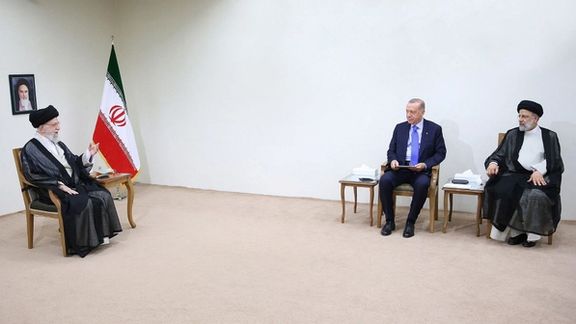
Both also stressed the importance of “Muslim unity,” with Khamenei describing the plight of the Palestinians as the most important issue for the “Islamic world.” Israel has a mixed relationship with Turkey, seen in Erdogan scaling back anti-Zionist rhetoric over the past two years and trade reaching around $7 billion in 2021, largely in Turkey’s favor.
IRNA noted Erdogan’s expressed opposition to unilateral sanctions – a reference to United States measures against Iran – and its commitment to Iran’s “legitimate expectations” from reviving the 2015 Iran nuclear deal, currently subject to year-long talks between Tehran and world powers.
Boosting trade
Khamenei talked of boosting economic links in both quantity and quality, saying Erdogan and Raisi would address the issue in other meetings. US ‘maximum pressure sanctions’ after 2018, threatening punitive action against third parties dealing with Iran, saw bilateral trade drop by around two-thirds by 2020 from $10.7 billion in 2017.
While analysts question figures suggesting trade has now rebounded beyond 5.6 billion in 2021, Erdogan said in Tehran he believed it could reach $30 billion.
Aside from resolving difference over Syria, where Russia continues its military presence in support of Assad, the three-way summit in Tehran is set to address a possible safe corridor through Turkey of grain from Ukraine and Russia. Iran is one of many countries importing grain from Russia and facing steep increases in prices with the Ukraine crisis.
The visit also comes in the wake of US President Joe Biden’s visit to Israel and Saudi Arabia, where he committed Washington to avoid leaving a “vacuum” in the Middle East to be filled by Russia, China, and Iran. Saudi Arabian officials have rejected talk of a new “defensive alliance” against Iran, as Riyadh continues to look to Moscow to coordinate global oil supplies through Opec+, which meets early in August.